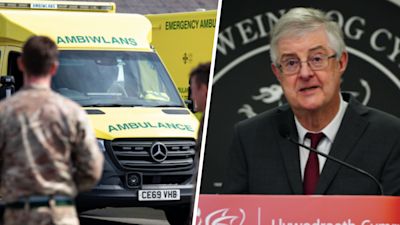Mark Drakeford defends ambulance service management despite workers saying it is 'soul destroying'

The First Minister has defended the Welsh Government's management of the ambulance service, saying that it has been recruiting new staff to take over when military help comes to an end.
Armed forces personnel have been working with ambulance services here in Wales and in other parts of the UK to try to help with pressures caused by the pandemic.
Mark Drakeford was challenged about the problems within the Welsh Ambulance Service during this week's First Minister's Questions.
The Conservative leader of the opposition, Andrew RT Davies, said ambulance workers had spoken of taking antidepressants because the job was becoming "soul destroying."
The opposition leader said: "It's been 18 months since the targets have been hit by the ambulance service and time and time again, I've raised it with you, members across the political divide have raised it with you, heart wrenching issues of experiences across the whole of Wales, where regrettably ambulances haven't been able to respond to life threatening situations.
"We know the ambulance service has been supported by the military on several occasions - across the United Kingdom that support has been offered I might add, not just here in Wales - that support is coming to an end on March 31.
"What measures has the Welsh Government, along with the ambulance service, put in place to make sure that we don't end up with a cliff edge on March 31 and ultimately, these figures deteriorate even worse than they are now?"
In response, the First Minister said that he wanted to put on record the Welsh Government's thanks to the military but that "it is inevitable that that help must come to an end and there are many other calls, as we know at the moment on the services of the military".
Drakeford added: "What the Welsh Government has been doing is to invest in new, permanent, full time members of staff trained to the level where they are able to carry out all the duties that you would expect the ambulance service to be able to undertake.
"At the same time, more broadly, the Welsh Government has been supporting the ambulance service in a two week reset of the service in the first half of this month.
"Now the results of that reset are still being analysed but I am pleased to say that over the last two weeks, we've seen a 10% reduction in the daily average ambulance hours lost compared to the two weeks before the reset was established.
"And I think that gives us some optimism that we are creating the platform that will allow the ambulance service to deal with a diminution in the number of people available to it as military help is withdrawn."